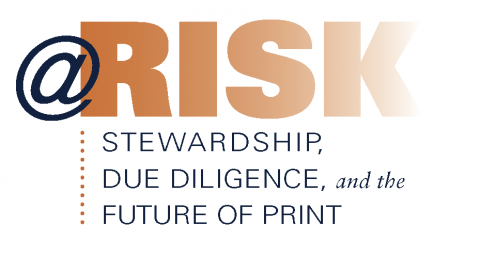While preparing for CRL’s 2018 Council of Voting Members meeting, I’ve been looking back over CRL’s 69-year history. During those years U.S. and Canadian libraries invested staff knowledge and expertise to build and maintain an immense shared collection. North American libraries also supported preservation of unique historical documentation that--absent their efforts--would have been lost. The legacy of these seven decades is not only a wealth of resources for historians and scholars, but a record of sustained, cooperative collections stewardship on an unparalleled scale.
This is a proud legacy, but not necessarily a formula for continued success. Today, new developments in the information, publishing and media worlds, and harsh new economic realities, have brought about a “sea change” for research libraries. So CRL has continued to evolve. Guided by the work of the Collections Assessment Task Force in 2001, strategic planning by CRL’s Board in 2006-2007, and continued oversight by the Collections and Services Policy Committee, CRL is expanding and digitizing collections; providing leadership, data support and collection analysis for shared print efforts; and supporting member licensing of primary source data and databases.
The 2016 Collections Forum @Risk: Stewardship, Due Diligence and the Future of Print yielded the outlines of an ambitious blueprint for enlarging and strengthening the shared collections safety net, the vision of a North American-wide trust network that actively builds, responsibly curates, and delivers access to print resources. A strengthened CRL commitment to Open Access has led to more robust investment in digitization through programs like Project Ceres, TRAIL, Reveal Digital, and the South Asian Open Archives.
In 2019 CRL will begin its eighth decade, and the times require new things: greater scale in collection sharing; creative approaches to preserving news and other primary research materials; and more functional access to those materials. They will also require growing CRL capabilities and technology, and the financial agility to adapt to evolving research needs and changing economic conditions.
In the coming weeks, in a series of “Sea change” posts on this blog, I will outline some ideas that have emerged from discussions with CRL’s Board and its Collections and Services Policy Committee, such as:
- Integrating CRL collections into a North America-wide shared collections network
- Increased investment in Open Access and shared digital resources
- Changing the CRL funding model to encourage participation by mid-size and smaller libraries.
At the May 17th Council meeting we will discuss these ideas in greater depth. Meanwhile, we invite member thoughts and reactions.
Bernard F. Reilly
President (2001-2019)
Center for Research Libraries
